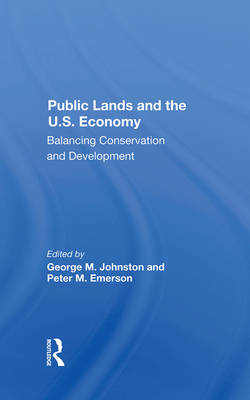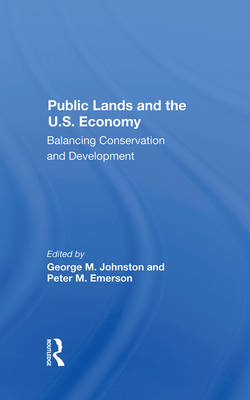
- Afhalen na 1 uur in een winkel met voorraad
- Gratis thuislevering in België vanaf € 30
- Ruim aanbod met 7 miljoen producten
- Afhalen na 1 uur in een winkel met voorraad
- Gratis thuislevering in België vanaf € 30
- Ruim aanbod met 7 miljoen producten
Zoeken
Public Lands and the U.S. Economy
Balancing Conservation and Development
George M Johnston, Peter Emerson
Hardcover | Engels
€ 121,95
+ 243 punten
Omschrijving
Current law requires the federal government to fulfill a broad spectrum of responsibilities in managing public lands; to protect and conserve the environment; to foster the appropriate development of marketable commodities; to preserve wilderness areas, wildlife habitats, and unique historical sites; and to encourage public participation in land-use and management decisions. There is no consensus, however, on the best ways to establish a balance among the? priorities when serious conflicts arise. This book presents a wide-ranging discussion of the means by which lands and resources administered by the Forest Service and the Bureau of Land Management can better serve present and future needs for environmental preservation and resource development. The contributors consider public and private interests in the federal lands in light of political realities and uncertainties, giving particular: attention to efficiency-versus-equity issues, privatization fair market value, and the income-producing potential of publicly owned assets. Major sections of the book focus on timber, nonfuel minerals, rangelands, and energy resources. Based on a recent conference sponsored by The Wilderness Society, the book reflects the views of conservationists, scholars, industry representatives, and state and federal officials.
Specificaties
Betrokkenen
- Auteur(s):
- Uitgeverij:
Inhoud
- Aantal bladzijden:
- 330
- Taal:
- Engels
Eigenschappen
- Productcode (EAN):
- 9780367284718
- Verschijningsdatum:
- 7/05/2019
- Uitvoering:
- Hardcover
- Formaat:
- Genaaid
- Afmetingen:
- 145 mm x 234 mm
- Gewicht:
- 589 g

Alleen bij Standaard Boekhandel
+ 243 punten op je klantenkaart van Standaard Boekhandel
Beoordelingen
We publiceren alleen reviews die voldoen aan de voorwaarden voor reviews. Bekijk onze voorwaarden voor reviews.












